
Danainae is a subfamily of the family Nymphalidae, the brush-footed butterflies. It includes the Daniadae, or milkweed butterflies, who lay their eggs on various milkweeds on which their larvae (caterpillars) feed, as well as the clearwing butterflies (Ithomiini), and the tellervini.

The Nymphalidae are the largest family of butterflies, with more than 6,000 species distributed throughout most of the world. Belonging to the superfamily Papilionoidea, they are usually medium-sized to large butterflies. Most species have a reduced pair of forelegs and many hold their colourful wings flat when resting. They are also called brush-footed butterflies or four-footed butterflies, because they are known to stand on only four legs while the other two are curled up; in some species, these forelegs have a brush-like set of hairs, which gives this family its other common name. Many species are brightly coloured and include popular species such as the emperors, monarch butterfly, admirals, tortoiseshells, and fritillaries. However, the under wings are, in contrast, often dull and in some species look remarkably like dead leaves, or are much paler, producing a cryptic effect that helps the butterflies blend into their surroundings.

The superfamily Papilionoidea contains all the butterflies except for the moth-like Hedyloidea.

The Heliconiinae, commonly called heliconians or longwings, are a subfamily of the brush-footed butterflies. They can be divided into 45–50 genera and were sometimes treated as a separate family Heliconiidae within the Papilionoidea. The colouration is predominantly reddish and black, and though of varying wing shape, the forewings are always elongated tipwards, hence the common name.

The Nymphalinae are a subfamily of brush-footed butterflies. Sometimes, the subfamilies Limenitidinae, and Biblidinae are included here as subordinate tribe(s), while the tribe Melitaeini is occasionally regarded as a distinct subfamily.

The Satyrinae, the satyrines or satyrids, commonly known as the browns, are a subfamily of the Nymphalidae. They were formerly considered a distinct family, Satyridae. This group contains nearly half of the known diversity of brush-footed butterflies. The true number of the Satyrinae species is estimated to exceed 2,400.

Hypolimnas bolina, the great eggfly, common eggfly, varied eggfly, or in New Zealand the blue moon butterfly, is a species of nymphalid butterfly found from Madagascar to Asia and Australia.

Danaus affinis, the Malay tiger, mangrove tiger or swamp tiger, is a butterfly found in tropical Asia. It belongs to the "crows and tigers", the danaine group of the brush-footed butterflies family.
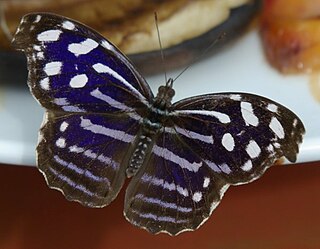
Biblidinae is a subfamily of nymphalid butterflies that includes the tropical brushfoots. This subfamily was sometimes merged within the Limenitidinae, but they are now recognized as quite distinct lineages. In older literature, this subfamily is sometimes called Eurytelinae.
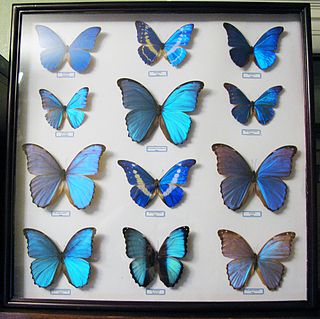
The Morphinae are a subfamily of Nymphalidae butterflies that includes the morphos, the owl butterflies (Caligo), and related lineages. It is either considered a sister group of the Satyrinae, or disassembled and included therein.

The Elymniini is one of the tribes of the subfamily Satyrinae. If the subfamily Satyrinae elevate to family status, this tribe shall be treated as subfamily Elymniinae. Elymniini was formerly a large group, but recently, it is considered to be include only one genus, Elymnias, according to molecular phylogenetic analyses.

Libythea labdaca, the African snout butterfly, is a member of the butterfly subfamily Libytheinae found in western and central Africa.
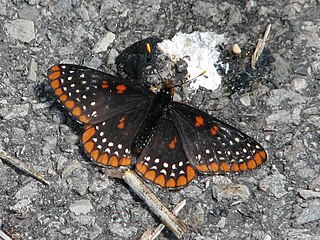
Euphydryas is a genus of Nymphalidae butterflies.
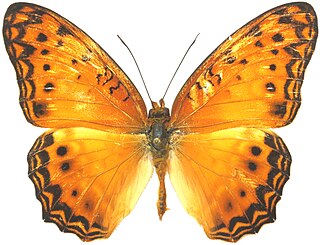
Phalanta eurytis, the forest leopard, forest leopard fritillary, or African leopard fritillary, is a butterfly of the family Nymphalidae. It is found in tropical Africa, Ethiopia, and Sudan.

Catuna is an Afrotropical genus of brush-footed butterflies.
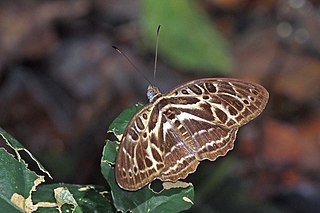
Catuna angustatum, the large pathfinder, is a butterfly in the family Nymphalidae. It is found in Sierra Leone, Liberia, Ivory Coast, Ghana, Togo, Nigeria, Cameroon, Gabon, the Republic of the Congo, the Central African Republic, the Democratic Republic of the Congo, Uganda, Rwanda and Tanzania. The habitat consists of forests.

Catuna crithea, the common pathfinder, is a butterfly in the family Nymphalidae. It is found in Guinea, Sierra Leone, Liberia, Ivory Coast, Ghana, Togo, Nigeria, Cameroon, Bioko, Angola, the Democratic Republic of the Congo, Sudan, Uganda, Kenya, Tanzania and northern and western Zambia. The habitat consists of dense lowland forests and the riverine forest floor.
Catuna niji, or Fox's pathfinder, is a butterfly in the family Nymphalidae. It is found in Sierra Leone, Liberia, Ivory Coast, western Ghana, western Cameroon, Gabon and the Democratic Republic of the Congo. The habitat consists of forests.
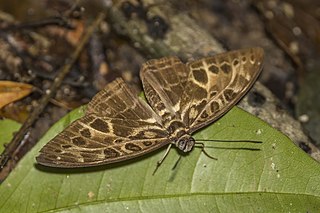
Catuna oberthueri, or Oberthür's pathfinder, is a butterfly in the family Nymphalidae, named after the French entomologist Charles Oberthür. It is found in Sierra Leone, Liberia, Ivory Coast, Ghana, Nigeria, Cameroon, the Republic of the Congo, the Central African Republic, the Democratic Republic of the Congo and western Tanzania. The habitat consists of forests.

Cephetola catuna is a butterfly in the family Lycaenidae. It is found in Cameroon, the Republic of the Congo, the Central African Republic, Gabon, the Democratic Republic of the Congo and Uganda. Adults females oviposit on lichens on the bark of twigs and tree trunks. The larvae are attended by ants.
















